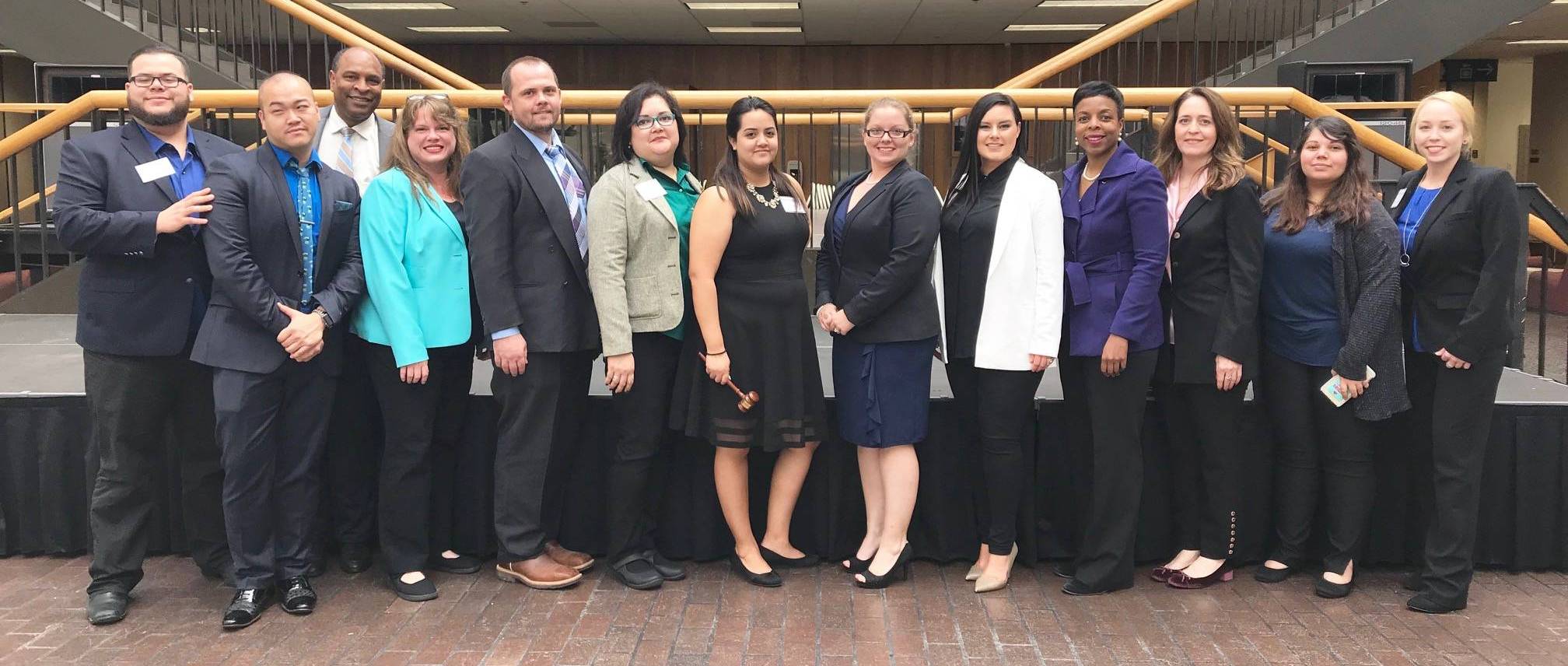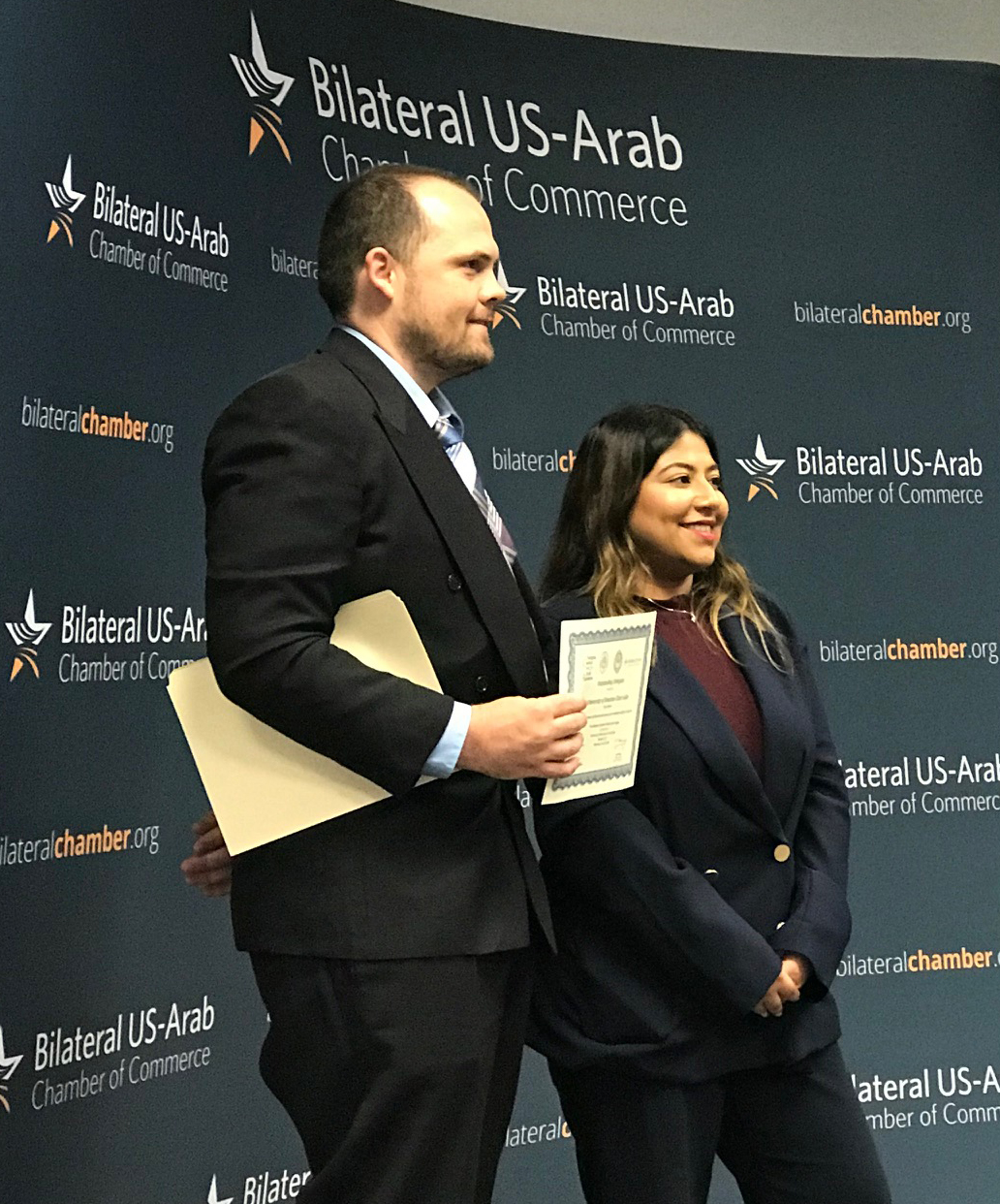Students sharpen debate, diplomatic skills at UHCL conference
March 2, 2018 | UHCL Staff

One hundred fifty students from seven colleges and universities converged on University
of Houston-Clear Lake’s campus to demonstrate their debating, research, and diplomatic
skills at the 11th Annual Bilateral Model Arab League conference Feb. 16-18. This
marks the second year the Model Arab League conference was hosted at UH-Clear Lake,
which has taken part in regional and national MAL competitions since 2008.
“The objective of Model Arab League is for students to do intensive research on the
authentic political positions of an assigned Arab country, then propose and argue
plans and resolutions that mirror that country’s actual position,” said Maria Curtis,
associate professor of anthropology and cross-cultural studies and co-adviser of the
university’s Model Arab League Student Organization. She explained that prior to the
conference, UHCL students were assigned to research and represent United Arab Emirates
at the competition.
“There are 22 Arab states and this simulation is like a smaller version of the full
Model United Nations simulation,” Curtis said. “Each nation’s council has a different
set of agenda topics that change each year. Students research their country thoroughly
and prepare to represent it as actual diplomats would on the councils.”
Curtis said discussions can get quite heated but are conducted strictly according
to parliamentary procedure. “You have to learn to become diplomatically assertive,”
Curtis said. “Debates are timed and students have to learn to think on their feet,
with no script. This offers students the opportunity to understand the motivations
of Arab governments.”
Confidence boosting
MAL Student Organization President Sara Ray, who earned a Bachelor of Science in Interdisciplinary
Studies with Early Childhood-6 Concentration in December 2017, is currently working
on her master’s in Cross Cultural Studies. She has been involved with MAL for three
years and became the organization’s leader last summer. “I was the general secretary
of the conference this year, which means I was overseeing all five councils and editing
draft resolutions as well as organizing vendors, handling security and signage for
the event,” she said. “I’ve gotten so much out of my time on MAL.”
Ray said that public speaking was nerve-wracking for her, but debating on the councils
had boosted her confidence in speaking before others. “This has also improved my researching
skills, because I’ve had to research things I knew nothing about. And I’ve learned
so much about conflict resolution,” she said. “This is all about coming up with solutions
that most everyone can agree on, and those are skills I will certainly need in my
career.”
She added that when she begins her career as a teacher, one of her primary objectives
is to teach her students to become global citizens. “I’ve learned so much about the
Arab world and I’ve learned to see things from not just the American perspective,
but from a global perspective. These are tools that I will take with me wherever I
go.”
Adopting a different perspective
 Senior Brian Boren, who is scheduled to graduate in May 2018 with a bachelor’s in
Humanities, acted as UAE’s head delegate. “The head delegate is a bit like a team
captain,” Boren explained. “I’ve competed three times in MAL, but I would call this
more of a simulation than a competition. You’re putting aside what you as an American
would think or do, and you’re role-playing an actual diplomat from that country, having
researched all their religious, social and political policies. It’s hard to do.”
Senior Brian Boren, who is scheduled to graduate in May 2018 with a bachelor’s in
Humanities, acted as UAE’s head delegate. “The head delegate is a bit like a team
captain,” Boren explained. “I’ve competed three times in MAL, but I would call this
more of a simulation than a competition. You’re putting aside what you as an American
would think or do, and you’re role-playing an actual diplomat from that country, having
researched all their religious, social and political policies. It’s hard to do.”
Boren said his experience working on MAL had completely shifted and expanded his world
view. “None of my history classes ever exposed me to people, cultural history and
government systems the way MAL has,” Boren said. “When I started taking Dr. Curtis’
classes, it turned over a new leaf for me. It challenged my world view and it challenged
how I had been socialized to believe about the Arab world.”
He said he’d also gained important critical-thinking skills that had forced him to
learn to adjust his position depending upon shifting political events. “While you’re
working in a simulation, you’re polishing all your job-related skills,” he said. “You
research the position of your country, but you also have to consider the positions
of 21 other nations and know their histories.”
As head delegate, Boren was on UAE’s Palestinian Council, which dealt with security
issues, improving access to clean water and humanitarian aid, increasing educational
and health infrastructure, and building consensus between opposing groups. “We spent
three hours writing a resolution that required a room full of people with diverse
ideas representing other countries to compromise and pass a substantial resolution
that reconciled the differences between two political factions in Palestine,” he said.
“We got them to work together to provide humanitarian aid.”
Boren said he implemented all the skills he’d need when he left the academic world.
“This is about becoming an effective public speaker, a researcher and a learning to
compromise and change your position based on new data,” he said. “And these resolutions
that we come up with don’t just die. Some language lives in real resolutions in the
actual Arab League. They’ve been voted on and passed. What we’re doing is real and
it shows how close you are as a citizen to this mechanism we live in. MAL is a great
window into that.”
In past years, Curtis said MAL at UHCL had represented Oman, Iraq, Saudi Arabia as
well as the United Arab Emirates. “Students have been able to get a true sense of
the diversity of culture, styles of government, and approaches to diplomacy and statecraft,
even within a single corner of the Arab world,” she said. “Each country has its own
way of doing things.”
At the end of the conference, the Palestinian Council voted on an Outstanding Delegate.
“Brian Boren won the award on behalf of UHCL in the Palestinian Council,” Curtis said.
“We had incredible dedication on the part of our students. They showed how hard they
were willing to work, and they showed great leadership.”
For more information about Model Arab League Student Organization, visit www.uhcl.edu/campus-life/involvement/student-organizations.
About the Author:
Recent entries by
October 18 2022
Better technology transforms campus safety: Police Chief demonstrates SafeZone to students
October 14 2022
Student's skill with drones takes chicken turtle research to new heights
October 11 2022
Planting event to help UHCL restore native plants to campus, support environmental sustainability








 Senior Brian Boren, who is scheduled to graduate in May 2018 with a bachelor’s in
Humanities, acted as UAE’s head delegate. “The head delegate is a bit like a team
captain,” Boren explained. “I’ve competed three times in MAL, but I would call this
more of a simulation than a competition. You’re putting aside what you as an American
would think or do, and you’re role-playing an actual diplomat from that country, having
researched all their religious, social and political policies. It’s hard to do.”
Senior Brian Boren, who is scheduled to graduate in May 2018 with a bachelor’s in
Humanities, acted as UAE’s head delegate. “The head delegate is a bit like a team
captain,” Boren explained. “I’ve competed three times in MAL, but I would call this
more of a simulation than a competition. You’re putting aside what you as an American
would think or do, and you’re role-playing an actual diplomat from that country, having
researched all their religious, social and political policies. It’s hard to do.”